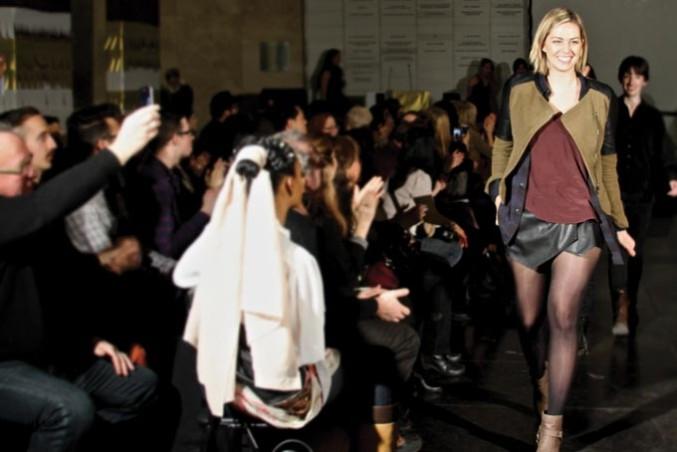By Jordan Cornish
The face of the fashion industry is getting a makeover and ecologically concerned fashion is what’s in style.
Ryerson’s School of Fashion held its second annual eco-conscious fashion show, Urban Revolution 2014, at the Sears Atrium in the George Vari Engineering and Computing Centre on Feb. 1.
Models hit the runway in original, eco-conscious pieces by Ryerson and Toronto designers as part of the school’s effort to support a fashion industry that considers environmental impact.
Natasha Mawji, a second-year fashion design student and show co-producer, addressed the packed room and kicked off the evening.
“It’s more than just a fashion show,” Mawji said. “Sustainable fashion is more beautiful and more accessible now than ever before.” The designers had to get creative to meet the required eco-conscious standards. Many used hybrids of recycled clothing and non-harmful materials, produced zero-waste designs and incorporated all their leftover scraps into final pieces.
Melissa Williams, a second-year fashion design student, used natural materials and zero-waste techniques in her three looks.
“I learned more about the ways you can look at fashion,” said Williams, who’d never employed eco-conscious techniques into her designs before volunteering for the show.
“It’s important to save as much material as you can because it just helps the environment and it pushes the boundaries for being creative,” she said.
The result was two or three innovative creations by each of the 12 participating designers, including one gown made entirely of recycled plastic bags. One of Williams’s models walked the runway barefoot in a dress knitted entirely out of hemp.
Sarah Portaway, associate professor of fashion photography and Ryerson fashion alumna, taught at one of two workshops for designers about incorporating sustainability into fashion construction and materials.
“The way we’re currently making fashion isn’t going to leave anything for future generations,” said Portaway, whom admits that there is no perfect eco-friendly garment, but says designers have to keep pushing for a more ethical industry.
Mawji said she believes the first step to eco-friendliness is getting designers to start considering the ecological impact of their designs early on in their careers.
Urban Revolution was started by two second-year fashion design students and has partnered with Enactus Ryerson, a campus entrepreneurial group.
This year the show’s entire proceeds – over $1,000 – went towards Enactus Ryerson’s Project Dago initiative which teaches entrepreneurship to villagers in Dago, Kenya.
Mawji notes fashion’s stigma as a self-seeking industry and hopes shows like this will change that.










Leave a Reply